- Home
- Eoin Colfer
Novel - Airman Page 24
Novel - Airman Read online
Page 24
I do not wish to leave, he realized. But I must. Staying was of no benefit to him or his family. Seven pouches. Then America.
The skiff was beached high on the shale, with a single set of tracks heading back toward Fulmar Bay. Zeb Malarkey was keeping his end of the deal—and why wouldn’t he, with half the diamonds in his coffers and more to come.
Conor sat on the boat’s gunwale, unfastening the glider’s harness. Not much flight damage tonight, but he would check every rib and panel tomorrow to make sure. Even the tiniest tear in the wing fabric could unravel an entire panel and drop him from the sky like a plugged pigeon.
One of the diamond pouches slipped from inside the harness, clinking on the shale. To Conor, the sound seemed louder than a gunshot; he squatted low in the skiff ’s shadow, then gathered the bag to his chest like a babe, scanning the Wall for movement. There was none but the liquid shimmer of lamplight.
Take care, Airman. One mistake could see you on the ferry back to Little Saltee. He stowed the pouches under the aft bench and laid his collapsed glider gently on the deck. Then something happened that made him smile. Conor stood straight, raising his palm to feel the breeze. The wind has changed. I can sail directly to Kilmore.
He slid the skiff along the shale to the lapping waterline.
Still waters and a fair wind. Good omens.
Conor felt the water raise the skiff and hopped on board, the deck shuddering under his weight. With one hand he untied the sail, shaking it loose of the mast; with the other, he grasped the extended tiller, setting a course wide around the west coast of Little Saltee.
Home in an hour, he thought. Perhaps Linus would play something. Music is a tonic for the soul.
Conor’s sail caught the breeze, pulling the small skiff across the waves.
A good boat. She skips along. He sailed for his new home, forcing himself not to look back. Nothing behind but heartache.
From high in the rocks, Arthur Billtoe watched the strange airman depart. And though a sharp rock pressed into the guard’s stomach, he would not so much as twitch until the man he had believed to be a demon had disappeared completely around the bend of Little Saltee’s coastline.
Pike did not have the necessary concentration span for such caution, and had relieved himself and was skipping stones into the surf before Billtoe joined him at the groove sliced by the skiff ’s keel in the shale. “Dunno why they call it Sebber Bridge,” muttered Pike. “It’s not a bridge, is it? Just a spit of stones going out into the current.”
“It used to be a bridge, thousands of years ago,” said Billtoe, the words rattling nervously out of him. “Before the sea washed it away. Went from here to Little Saltee, then from there on to Patrick’s Bridge, on the mainland.”
“That airman really turns your backbone soft, don’t he, Arthur?” said Pike, changing the subject.
“He had a sword at my neck. A ruddy big sword, none of your fencing namby-pamby pin prickers. This thing could take the top off an oak tree.”
“He’s a man, though, Arthur. You seen it yourself. Those wings of his are some sort of kite. That’s all.”
“That’s all!” said Billtoe incredulously. “You idiot! Don’t you realize what we have just witnessed?”
“Idiot? Arthur, idiot?” said Pike, injured. “I took away your devil, didn’t I? You can sleep again because of my gift. Idiot seems a bit harsh.”
“Not harsh enough,” snapped Billtoe, who was fast forgetting his fear. “That man has a flying device. Have you any idea how much the Battering Rams would pay for that? They could just drop into whatever port they pleased, and hang Customs. A device like that would change smuggling forever.”
Pike cleared his throat. “As it happens, I knows a few gents who might have ties to the Rams. Possibly.”
Billtoe clamped a hand over Pike’s mouth, as though the gents in question could somehow hear. “No. No. We don’t involve the Rams until we have those wings locked up safe somewhere. Otherwise those treacherous coves would nab the wings themselves and feed us to the sharks. What we want is to get ourselves into a strong bargaining position.”
Pike shrugged off Billtoe’s hand, which stank of sweat and worse. It was clear to him that they were friends no more. It was business as usual for Arthur Billtoe, which meant that Pike was back to being a lackey to be abused.
“Whatever you say, Arthur.”
“That’s . . .”
“I know, that’s Mister Billtoe to me.” He turned to the sea, skipping one of the stones in his hand across the surface. Typical Arthur Billtoe. I took away his devil, and he forgets it with the first sniff of a payoff. I thought it was Pikey and Billtoe to the end. How wrong I was.
Throwing the stones calmed him, each successful skip reminding him of his childhood. He was reaching back for a big throw when Billtoe grabbed his arm, then wrestled the stone from his fingers. “Where did you get this?” he demanded, excitement reddening his cheeks.
Pike wondered if this was one of those questions that weren’t really questions, and if he answered it, would he look stupid?
“It’s a stone, Arthur . . . Mister Billtoe. I just picked it up.”
Billtoe dropped to his knees, scrabbling in the shale until he found half a dozen more stones that pleased him. He held them in his cupped palms, like a tramp guarding his egg breakfast.
“Arthur. Are you feeling ill? Would you like me to collect a few more stones for you? I saw a nice piece of wood farther along.”
Billtoe was too happy to be annoyed. “These are not just stones, Pikey. These are rough diamonds. That’s why our airman was stopping off on Little Saltee. He’s a diamond smuggler.” He rubbed his hands together, clinking the diamonds like voodoo bones.
“Are you trying to tell the future with those things?” joked Pike, the naked greed in Billtoe’s eyes making him nervous.
“I know the future,” said Billtoe. “We round up a few of the boys; we ambush this airman, sell his wings, and steal his diamonds.”
“What about the airman? We let him go free, I suppose.”
Billtoe elbowed him good-naturedly. “Nice one, Pikey. Let him go free. No, we kill him, cut him into little pieces, and then burn the pieces. As far as the world is concerned, this airman never existed.”
Pike swallowed. All this talk of blood made him nervous. He resolved there and then never to invent anything useful, or Billtoe might orchestrate a gruesome end for him, too.
CHAPTER 15: HOME
There was almost perfect peace as Conor sailed the skiff north northeast between the Jackeen and Murrock Rocks in the Saltee Straits. These rocks spent most of their lives submerged, but sometimes a trough dipped low, exposing their flattened peaks. When the five-year-old Conor had first seen these gnarled, oblong shapes one evening on the patrol boat with his father, he was convinced they were crocodiles and would not be calm until Declan agreed to fire a warning shot. Sure enough, the crack of gunfire did the trick, and the two crocodiles sank below the waters.
This little story had become one for the fireside, and it was dusted off whenever a friend visited for brandy or lemonade. It had always made Conor scowl, but now it near drove him to tears. I cannot endure this. They are too close.
His mother’s face seemed to hover before him, calling him home, and he could ignore her no longer. No doubt she suffered as much as he did, perhaps more. He needed to know. If I could just see them. Look on their faces once more before I leave, to make sure they endure.
Conor nudged the tiller with his knee, and tightened the sail for a southwest tack. He was going home.
From a few leagues out, Saltee Harbour seemed much as Conor remembered it. A grand tiara, points shining silver and orange. Inside the pincers of the sea walls, it was clear that some of the tiara’s luster had faded over the past few years. Sea slime crawled along the granite, and the dock was clogged with haphazardly berthed boats, trussed together like tangled tops. The new outer wall project had been abandoned, and the half-built stru
cture trailed off into the sea like an eroded sand fort. The planned beacon tower was only half built and stood askew, a crumbling reminder of a past era, rather than the proud symbol of a new one. King Nicholas’s loss was being keenly felt, even here on the waterfront.
Conor knotted the skiff ’s stern line to a mussel boat and tossed the anchor into the half tide. It fizzed, bubbled, then sank quickly, bearing with it three securely fastened satchels of diamonds. Conor skipped across the prows of half a dozen bobbing fishing boats, then hauled himself to the quayside flagstones with the aid of a brass hitching ring.
He strolled nonchalantly along the quay, flicking his eyes upward to the Wall guards. Whatever else grew slack and haphazard, Declan Broekhart would not allow his Sharpshooters to lower their standards. Four guards stood atop the wall, their wind capes fluttering around them. Conor saw the glint of a barrel, and he knew that at the first sign of belligerence, a warning shot would kick up sparks and slivers at his feet; at the second sign he would be dead before his body hit the water. He moved slow and easy with both hands in plain sight.
The quayside walkway curled the length of the outer wall to a cobbled market area, which would be bustling with stalls during the day. Merchants, innkeepers, and housewives converged on the market each morning to fill their baskets with mackerel, cod, pollock, mussels, lobster, crab, crayfish, and salmon. Boats arrived empty from Kilmore and left full, or vice versa, depending on which crew had the run of the waters that day.
By evening, the air was tangy with smells of turning fish and salt. Scrubbers pumped water from the harbor, hosing the blood and guts into the sea. Most young lads on the Saltees had done their time as scrubbers: armed with stout-bristled brushes and the energy of youth, they scrubbed the grime from the flagstones, only to have them be splattered crimson once more the following day.
Conor walked beneath the Wall arch, past a Customs booth.
“Anything?” asked the guard.
Conor raised his empty palms. “Just a raging thirst, sir, and a rendezvous with my sweetheart.”
The guard smiled. “Ah, the beer and Bessies. Two good reasons to visit the Saltees. It’s not your first time inside the Wall, then?”
Ahead, on the hill, the palace turrets poked into the night, blotting out patches of stars.
“No, sir. I’ve been here before.”
As a boy, Conor had not spent every minute lost in his studies. He’d passed his share of time up to his armpits in mud and seaweed. He’d climbed cliffs, built dams, and on occasion stolen eggs from the puffins that waddled along the flat rocks like clockwork toys. These manly endeavors sometimes caused him to miss his curfew, and when this happened, Conor would spy through the windows of the Broekhart apartments, to see whether or not his father was home, or even what kind of mood his parents were in.
He occupied the same spot now, straddling a gargoyle drain, ten feet off the ground across the square from the Broekhart house. Water from the salt spray trickled from the gargoyle’s mouth, painting white streaks on its twisted stone lips. Even climbing the wall brought pangs of longing for home. My feet find the footholds in the stone. I climb this wall as though I had done it only yesterday.
The Broekhart house was quiet and dark, but for a single candle in the kitchen window. There was no sign of his parents. It is late, I suppose.
Conor was greatly disappointed, but relieved, too. The knot of nerves in his stomach was tighter now than it had been during his balloon flight from prison. He realized that if he had seen his parents in abject misery, it would have been almost impossible not to venture inside and reveal the truth. They hate me now, Mother and Father both, but it is a false hate. Manufactured. Underneath, there will still be love.
Inside the Broekhart dwelling, a shadow drifted into the kitchen. Conor felt his pulse throb in his forehead. Perhaps my mother cannot sleep; nightmares haunt her as they do me.
It was his mother. Catherine Broekhart drifted past the window, her hair sleep-disheveled. Her eyes were half closed, and both hands waved the air until her eyes adjusted to the sudden light.
Mother. Oh, Mother. The simple sight of her tore down the barriers Conor had erected around his heart. It was time to end Bonvilain’s cruel charade. The consequences were on the marshall’s head, not Conor’s. He shifted his weight to dismount the gargoyle, then froze. His father had entered the kitchen, and he was not alone. There was a child in his arms, a tousled toddler, lower lip jutted with bad temper.
A child. My brother. His father was not the broken man he imagined. Declan Broekhart wore a familiar smile as he coddled the little boy, wrapping him in the sleeve of his robe. He spoke, and through the open window Conor recognized his tone even if he couldn’t quite make out the words. My father is happy.
Catherine poured a mug of water for the little boy, and they fussed over him together, sitting by the fireplace while he had his drink. Gradually the child’s temper softened, as the memory of his nightmare was replaced by the sight of two loving parents.
Outside on the gargoyle, Conor felt scalped, as though the final remnants of Conor Broekhart had been cut away. A child. A brother. Things were not as he had imagined them. It seemed that he was the only one suffering. His parents had rediscovered happiness with their new son.
The cold of the stone gargoyle spread through his thighs, creeping up into his chest. Salty spray fell in sheets over the Wall, drenching his jacket, the chill soaking through to his shoulders. They have a good life, thought Conor. They are happy again. Conor knew that he could not reveal himself, or the truth. Bonvilain would kill them without a second’s hesitation. It would be my fault.
Conor turned his face away from the window and swung himself down from the gargoyle. I am Conor Finn, he told himself, taking quick determined steps toward the harbor.
The airman flies one more time. Two bags of diamonds, and then America.
Forlorn Point
Linus Wynter was busy when Conor reached the tower. He had completely rearranged the sleeping chamber to his personal preference. There was hot chocolate on the stove, along with a pot of bacon and potatoes, and he was stitching a seam on the sleeve of his dress coat.
“It’s the middle of the night,” said Conor, climbing through the elevated door.
Linus tapped his temple. “It’s always night for me, boy. I sleep when I am tired.”
Conor peered down into the cellar. “Why do you bother to move the furniture? We leave in a few days—I told you this.”
“In a few days. Your precious flying machine is not finished.”
When Conor was not patching the wings on his glider, he spent every minute constructing the aeroplane he had designed in prison, complete with petrol engine and retractable landing gear. “It is almost complete. Anyway, if needs be, I can ship it to America.”
“We’re not tethered to one another,” said Linus, laying the needle against his finger to find the ripped seam. “Maybe I’ll stay behind and save your family myself.”
“My family don’t need saving. They live in a palace with a new son.”
This gave Linus pause. He listened for Conor’s breathing, then walked carefully toward him, feeling for his shoulders. “You are so tall,” he said, surprised. “Victor said you would be. Long bones, Frenchy always said. So you have yourself a little brother. That is wonderful news. Wouldn’t you like to meet him before you leave?”
Conor felt tears film across his eyes. “I . . . I, of course, that is what I would like, but what would it mean for the child . . . My . . .”
“You can say it,” said Linus. “He is your brother.”
“What would it mean for my brother?” blurted Conor. “Bonvilain would murder him. If my father challenges the marshall, he will kill them all.”
Linus seemed to glare down at Conor, as though he could see through the silk scarf tied across his eyes. “And what of Isabella? I hear talk in the village, she has already repealed taxes and abolished import duty. She is becoming a true queen.
How do you think Bonvilain will respond to that?”
Conor wiped his eyes. “She is the queen. She has people to protect her. She loved me, she said, and yet she believed that I helped to kill her father.”
“That’s not what I hear. There is talk of Conor Broekhart in the village, too. He was a hero, they say. He died trying to protect the king.”
Conor snorted. “The official story. Bonvilain said that my part in the murder would be covered up to spare my family. That was his gift to the Broekharts.”
“And you are certain that Isabella was included in this deception?”
This was a startling thought. What if Isabella had not known? Imagine if she believed her young suitor to have perished that night. Don’t think about it. It is too painful, and it makes not a jot of difference.
Conor sat at his workbench, clenching both fists before his own face.
“Please, Linus, stop. I can’t bear to explore possibilities. My connection with the Broekharts is severed. I cannot be responsible. Bonvilain is too big. I am Conor Finn.”
“The name Finn. Bonvilain’s gift to you.”
Conor felt as though his forehead were collapsing, crushing his brain. Love, family, happiness. They are luxuries. Life is the prize. Stay alive and keep your family alive. “I am alive. I will stay alive.”
Linus barked a short laugh. “Stay alive? Which is why you hurl yourself daily from a tower?”
“I made a promise to Otto Malarkey.”
“So you would kill yourself for diamonds, but not for family or honor. I think Victor would be much disappointed in his student.”
Conor surged to his feet. “Do not lecture me, old man. You are not my father.”
“Exactly right, boy,” said Linus softly, the anger draining from his face. “I am not your father.”
Conor turned his back without another word, gathered the collapsed glider under his arm, and climbed the ladder to the roof.

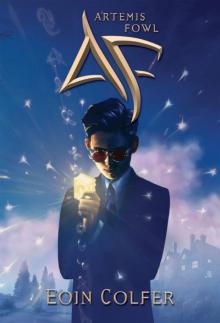 Artemis Fowl
Artemis Fowl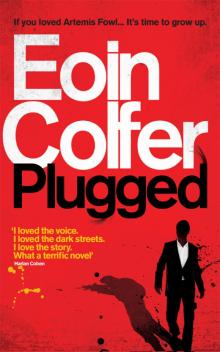 Plugged
Plugged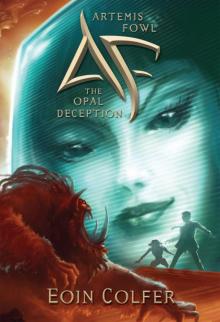 The Opal Deception
The Opal Deception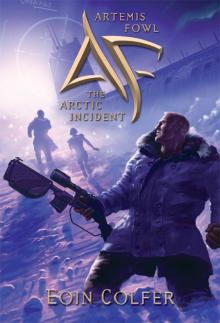 The Arctic Incident
The Arctic Incident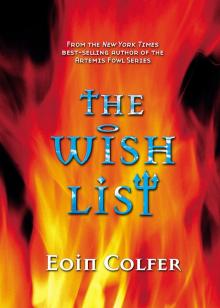 The Wish List
The Wish List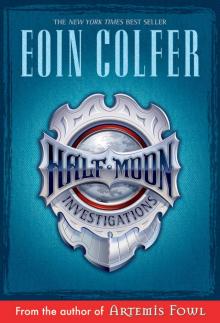 Novel - Half Moon Investigations
Novel - Half Moon Investigations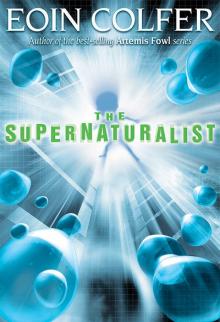 The Supernaturalist
The Supernaturalist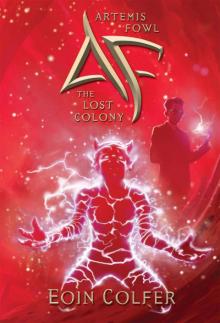 The Lost Colony
The Lost Colony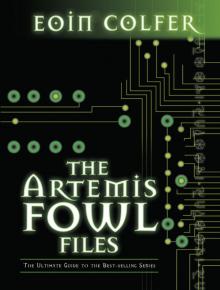 The Artemis Fowl Files
The Artemis Fowl Files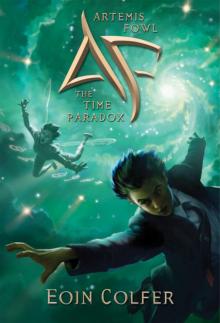 The Time Paradox
The Time Paradox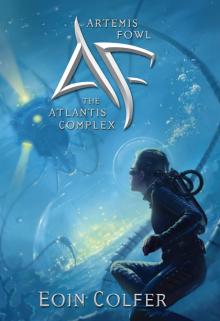 The Atlantis Complex
The Atlantis Complex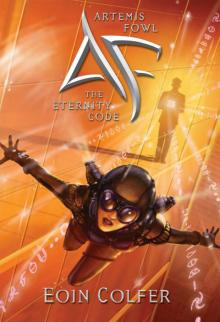 The Eternity Code
The Eternity Code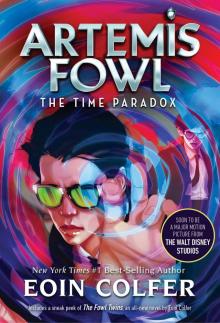 The Time Paradox (Disney)
The Time Paradox (Disney)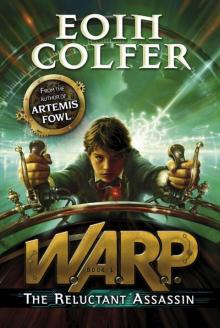 The Reluctant Assassin
The Reluctant Assassin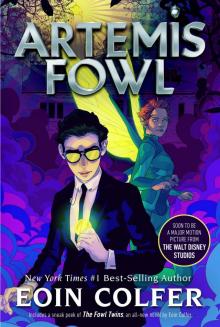 Artemis Fowl (Disney)
Artemis Fowl (Disney)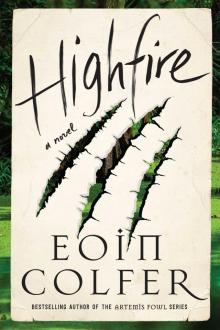 Highfire
Highfire The Last Guardian
The Last Guardian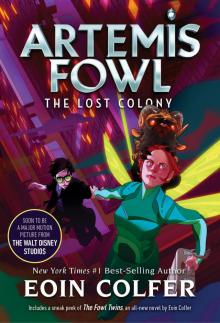 The Lost Colony (Disney)
The Lost Colony (Disney)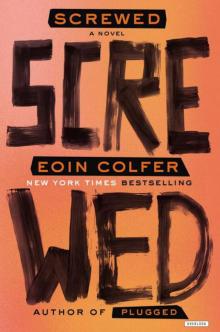 Screwed: A Novel
Screwed: A Novel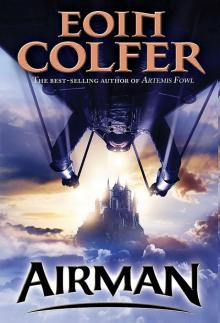 Novel - Airman
Novel - Airman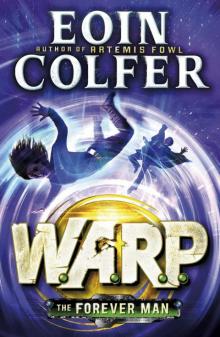 The Forever Man
The Forever Man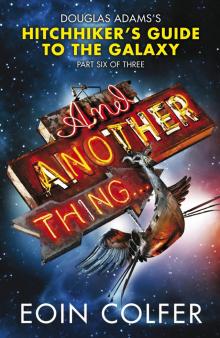 And Another Thing...
And Another Thing...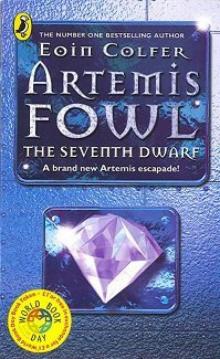 The Seventh Dwarf
The Seventh Dwarf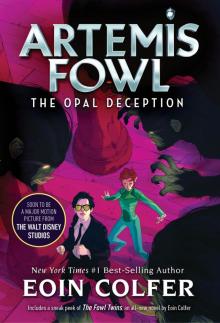 The Opal Deception (Disney)
The Opal Deception (Disney)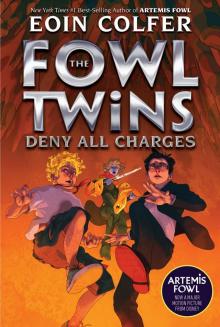 The Fowl Twins Deny All Charges
The Fowl Twins Deny All Charges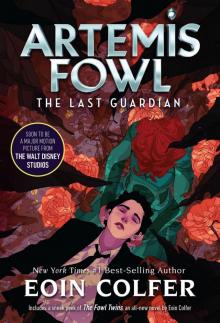 The Last Guardian (Disney)
The Last Guardian (Disney)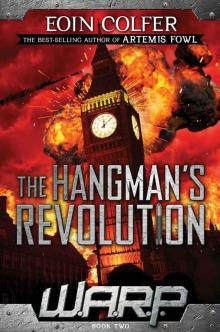 The Hangman's Revolution
The Hangman's Revolution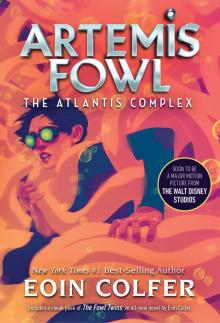 The Atlantis Complex (Disney)
The Atlantis Complex (Disney)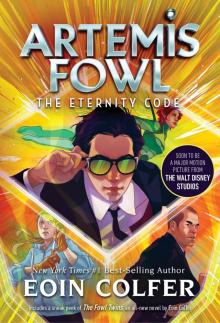 The Eternity Code (Disney)
The Eternity Code (Disney)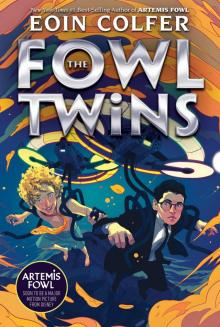 The Fowl Twins
The Fowl Twins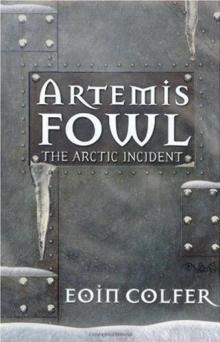 Artemis Fowl. The Arctic Incident af-2
Artemis Fowl. The Arctic Incident af-2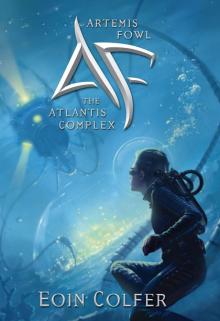 Artemis Fowl and the Atlantis Complex af-7
Artemis Fowl and the Atlantis Complex af-7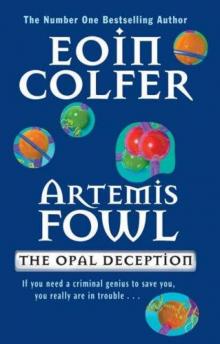 Artemis Fowl. The Opal Deception af-4
Artemis Fowl. The Opal Deception af-4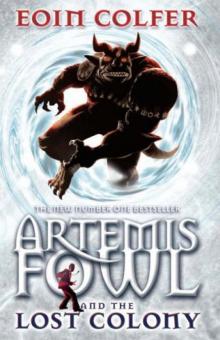 Artemis Fowl. The Lost Colony af-5
Artemis Fowl. The Lost Colony af-5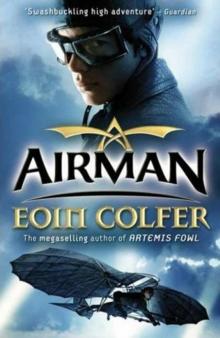 Airman
Airman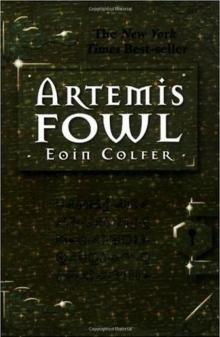 Artemis Fowl af-1
Artemis Fowl af-1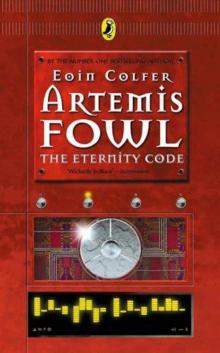 Artemis Fowl: The Eternity Code af-3
Artemis Fowl: The Eternity Code af-3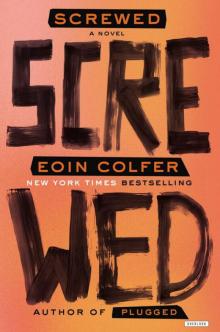 Screwed dm-2
Screwed dm-2